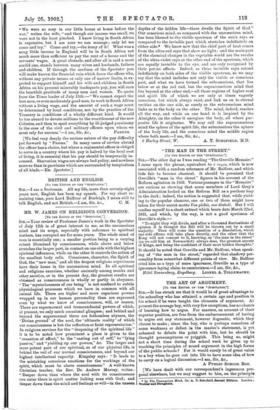" THE MAN IN THE STREET." [To THE EDITOR OF
THE "SPECTATOR."] SIR,—The other day as I was reading "The Greville Memoirs" I came upon the phrase, equivalent to O Tvxcle, which is now associated with a random utterance of Mr. Balfour, and which bids fair to become classical. ft should be premised that
Greville's "man in the street" figures in his account of the Reform agitation in 1831. Various passages in the "Memoirs" are curious as showing that some members of Lord Grey's Administration looked on the Reform Bill as a perilous leap in the dark; indeed, the notion is suggested that, while yield- ing to the popular clamour, one or two of them might have taken for their secret motto Tom plebis, vox diaboli. But I will confine myself to a short extract which bears date March 22nd, 1831, and which, by the way, is not a good specimen of Greville's style :—
" To-night they will divide, and after a thousand fluctuations of opinion it is thought the Bill will be thrown out by a small majority. Then will come the question of a dissolution, which one side affirms will take place directly, and the other that the King will not consent to it, knowing, as 'the man in the street' (as we call him at Newmarket) always does, the greatest secrete of Kings, and being the confidant of their most hidden thoughts."
It should be noted that Greville and Mr. Balfour, when speak. ing of " the man in the street," regarded that shadowy per. sonality from somewhat different points of view. Mr. Balfour cited him as a type of mere ignorance, Greville as a type of ignorance laying claim to omniscience.—I am, Sir, etc.,
Hotel Sonnenberg, Engel berg. LIONEL A. TOLLEMACHE.






































 Previous page
Previous page